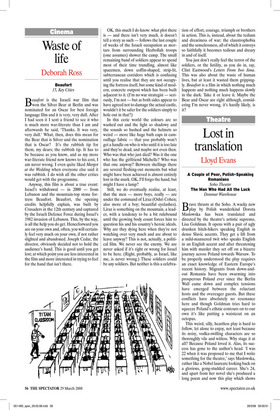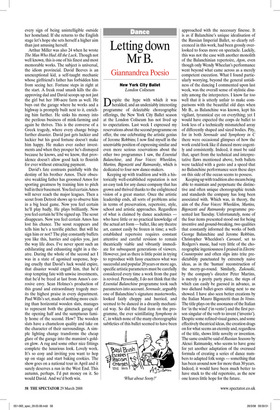Lost in translation
Lloyd Evans
A Couple of Poor, Polish-Speaking Romanians Soho Theatre The Man Who Had All the Luck Donmar Warehouse
Brave thrusts at the Soho. A wacky new play by Polish wunderkind Dorota Maslowska has been translated and directed by the theatre’s artistic supremo, Lisa Goldman. It opens with a pair of ugly drunken hitch-hikers speaking English in dense Slavic accents. They get a lift from a mild-mannered twit who speaks English in an English accent and after threatening him with murder they set off on a bizarre journey across Poland towards Warsaw. To be properly understood the play requires an exact knowledge of Eastern Europe’s recent history. Migrants from down-andout Romania have been swarming into prosperous Poland ever since the Berlin Wall came down and complex tensions have emerged between the reluctant hosts and the overeager guests. But these conflicts have absolutely no resonance here and though Goldman tries hard to squeeze Poland’s ethnic contours on to our own it’s like putting a waistcoat on an octopus.
This weird, silly, heartless play is hard to follow, let alone to enjoy, not least because its noisy, vodka-swilling characters are so thoroughly vile and witless. Why stage it at all? Because Poland loved it. Alas, its success has gone to the author’s head. ‘I was 22 when it was proposed to me that I write something for the theatre,’ says Maslowska, rather like a Nobel laureate looking back on a glorious, gong-studded career. She’s 24, and apart from her novel she’s produced a long poem and now this play which shows every sign of being unintelligible outside her homeland. If she returns to the English stage let’s hope she sets herself a higher aim than just amusing herself.
Arthur Miller was also 24 when he wrote The Man Who Had All the Luck. Though not well known, this is one of his finest and most memorable works. The subject is universal, the idiom provincial. David Beeves is an unexceptional kid, a self-taught mechanic whose girlfriend’s father has forbidden him from seeing her. Fortune steps in right at the start. A freak road smash kills the disapproving dad and David scoops up not just the girl but her 100-acre farm as well. He buys out the garage where he works and a highway is promptly built next to it, enriching him further. He sinks his money into the perilous business of mink-farming and again he thrives. This is the converse of a Greek tragedy, where every change brings further disaster. David just gets luckier and luckier but his good fortune doesn’t make him happy. He makes ever rasher investments and when they prosper he’s dismayed because he knows, and we know, that providence doesn’t allow good luck to flourish for ever without extracting payment.
David’s fate contrasts painfully with the destiny of his brother Amos. Their obsessive weakling father has groomed Amos for sporting greatness by training him to pitch ball in their basement. You feel certain Amos will never reach the major leagues. Then a scout from Detroit shows up to observe him in a big local game. Now you feel certain he’ll play badly. He plays brilliantly. Now you feel certain he’ll be signed up. The scout disappears. Now you feel certain Amos has lost his chance. The scout reappears and tells him he’s a terrific pitcher. But will he sign him or not? The play constantly buffets you like this, harries and cajoles you, just the way life does. I’ve never spent such an exhilarating and exhausting night in a theatre. During the whole of the second act I was in a state of agonised suspense, hoping cruelly that David’s luck would expire, that disaster would engulf him, that he’d stop tempting fate with unwise investments, that he’d be freed at last from Amos’s corrosive envy. Sean Holmes’s production of this grand and extraordinary tragedy merits the highest praise in every department. Paul Wills’s set, made of nothing more exciting than horizontal wooden slats, manages to represent both the gimcrack garage of the opening half and the sumptuous family home of the second. How? The wooden slats have a chameleon quality and take on the character of their surroundings. A simple lighting change transforms the cheap glare of the garage into the mansion’s golden glow. A rug and some other nice fittings complete the luxurious look. Lovely work. It’s so cosy and inviting you want to hop up on stage and start baking cookies. The show goes on a national tour in April and it surely deserves a run in the West End. This autumn, perhaps. I’d put money on it. So would David. And we’d both win.

















































































 Previous page
Previous page